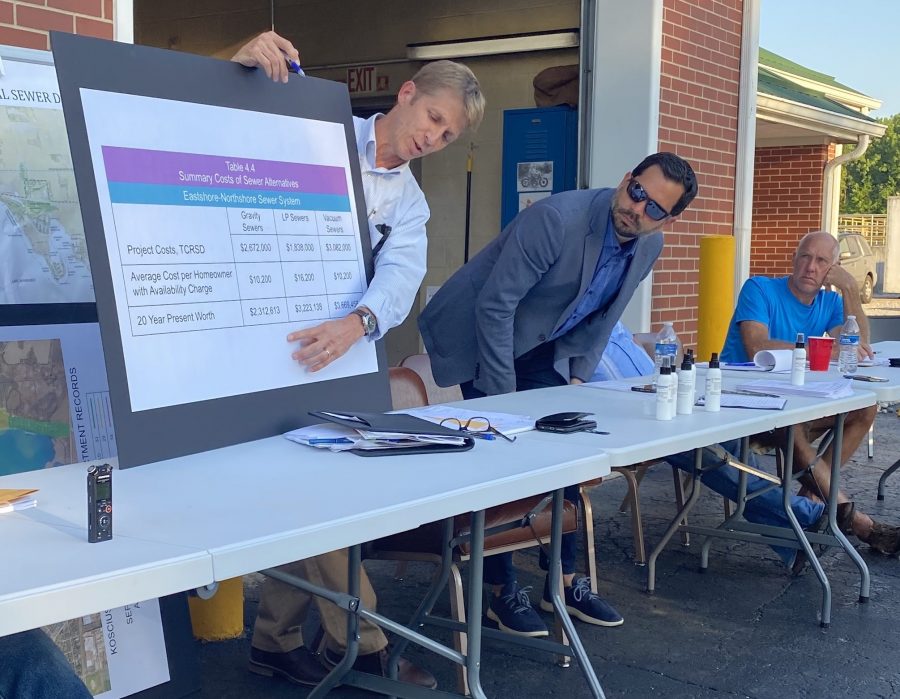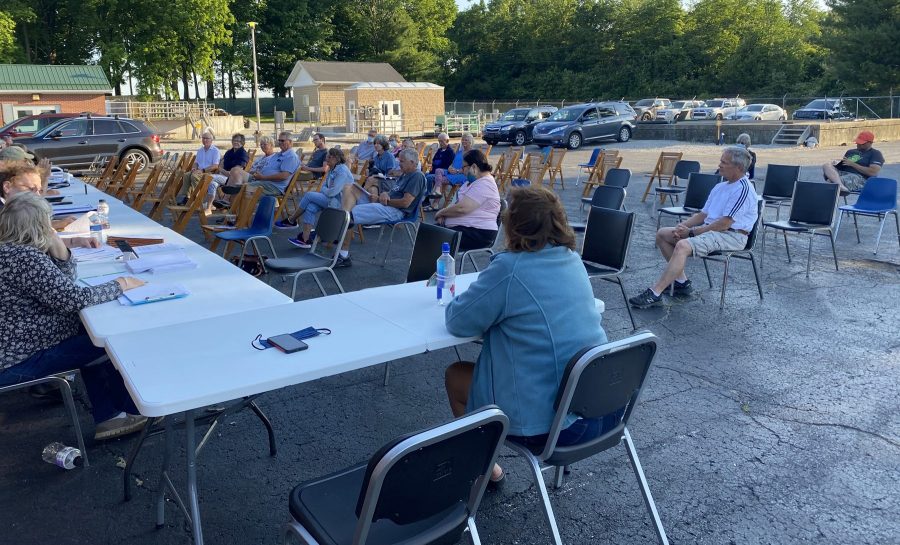Turkey Creek Sewer Makes Progress With Feasibility Study, Grant Funding

Jeff Hersha, of Jones & Henry, presented the district with cost estimates for three types of sewer systems, and ultimately recommended a gravity flow system. Andrew Boxberger, middle, and board member Keith Ort, right, listen as Hersha explains each system. Photo by Chelsea Los.
By Chelsea Los
InkFreeNews
CROMWELL — Turkey Creek Regional Sewer District made up for months of digital meetings by holding its first in-person, socially distanced meeting since COVID-19. The regular monthly meeting for June ran from 7 to 7:14 p.m. Monday, June 15, and was followed by a special public hearing that began at 7:30 p.m.
The board encouraged the public to hold questions until the special meeting to make sure all the public was present and each committee officer had a chance to present.
Between these two meetings, the board and attorney covered: the preliminary engineering report, the engineering recommendation for sewer systems, the progress of grant writing, the estimated costs if the project moves forward, and the logistics behind the decisions.
It’s no secret the board has been pushing for adding more sewer around Lake Wawasee since the first requests came to light in early 2019. Since then, the board held many discussions that turned heated as property owners pointed out the lack of data to prove a need to eliminate septic. The resounding cry of “ramming this down our throats” led the board to table the discussion, re-opening it with a new plan of attack and a new attorney, Andrew Boxberger.
Boxberger led many of Monday night’s discussion points, working with Jeff Hersha of Jones & Henry to address common concerns upfront, providing a printed handout that addressed how the board has power to choose to sewer and what state statute grants it. Boxberger helped the board push through an updated rate ordinance that didn’t make significant changes, but rather clarified some existing ones. Updates included a $100 flat fee to obtain a connect permit, a $50 disconnect fee, an updated attorney cost, and a clarification that allowed that flat $5,800 connection fee to be paid during a 60-month period for all projects with interest.
Hersha presented the much-anticipated preliminary engineering report based on info provided by the district and collected by his engineers. This report examined three types of sewer systems — gravity flow, low-pressure, and vacuum — and provided data that allowed Hersha to recommend gravity sewering should the district choose to move forward with the project. He also noted his report had been sent to the state revolving fund in an attempt to gain funding for the project.
Nancy Shields, Judy DeLury, Kathleen and David Johnston, Myron Bontrager, Andrea and Ron Koepke, Todd Yoder, Frank Doolittle, Niki Pawlicki, and Ryan Bouillon each spoke during public comment time to ask questions about the future plans and what they might hold.
Bontrager listened to the presentations, then questioned the hypothetical timeline for the project, saying “what’s next?” Hersha and Boxberger had slightly different timelines, but Hersha explained much of the next months would be determined by what results return from the state revolving fund and the grant writer.
Others questioned whether this project would move forward regardless, but Boxberger explained there could still be factors that would make the project not feasible. One example would be the health department granting a huge number of exemptions to remain on septic systems, although it doesn’t seem likely. Andrea Koepke continued to express frustration at the large cost homeowners will be forced to swallow — an estimated $10,000 expense — and offered the suggesting of getting the district to test each septic system and require those specific homeowners do repairs. Boxberger and Hersha reminded the public the district does not have legal rights to do septic testing, noting homes found to be in violation would actually be condemned with immediate eviction.
The board and officers covered many more questions from the public, which can be found on the recording that will be published on the TCRSD website after the July meeting approval of minutes.

The TCRSD board set up chairs with plenty of spacing and provided hand sanitizer for the meeting. Several public members also wore face masks to the outdoor hearing. Photo by Chelsea Los.
